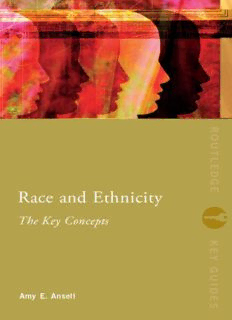
Race and Ethnicity: The Key Concepts PDF
Preview Race and Ethnicity: The Key Concepts
R O U T L E D G E Race and Ethnicity The Key Concepts K E Y G U I D Amy E. Ansell E S RACE AND ETHNICITY Situating the study of race and ethnicity within its historical and intellectual context, this much needed guide exposes students to the broad diversity of scholarship within the field. It provides a clear and succinct explanation of more than 70 key terms, their conceptual evolution over time, and the differing ways in which the concepts are deployed or remain pertinent in current debates. Concepts covered include: (cid:1) apartheid (cid:1) hybridity (cid:1) colonialism (cid:1) Islamophobia (cid:1) constructivism (cid:1) new/modern racism (cid:1) critical race theory (cid:1) reparations (cid:1) eugenics (cid:1) transnationalism. Fully cross-referenced and complete with suggestions for further reading, Race and Ethnicity: The Key Concepts is an ideal resource for students of race, ethnicity, and nationalism. Amy E. Ansell is Professor and Dean of Liberal Arts at Emerson College, USA. ALSO AVAILABLE FROM ROUTLEDGE Race and Ethnicity: The Basics Peter Kivisto and Paul R. Croll 978-0-415-77374-4 The Routledge Companion to Race and Ethnicity Edited by Stephen M. Caliendo and Charlton D. Mcllwain 978-0-415-77707-0 RACE AND ETHNICITY The Key Concepts Amy E. Ansell Firstpublished2013 byRoutledge 2ParkSquare,MiltonPark,Abingdon,OxonOX144RN SimultaneouslypublishedintheUSAandCanada byRoutledge 711ThirdAvenue,NewYork,NY10017 RoutledgeisanimprintoftheTaylor&FrancisGroup,aninformabusiness ©2013AmyE.Ansell TherightofAmyE.Anselltobeidentifiedasauthorofthisworkhasbeen assertedbyherinaccordancewithsections77and78oftheCopyright, DesignsandPatentsAct1988. Allrightsreserved.Nopartofthisbookmaybereprintedorreproduced orutilisedinanyformorbyanyelectronic,mechanical,orothermeans, nowknownorhereafterinvented,includingphotocopyingandrecording, orinanyinformationstorageorretrievalsystem,withoutpermission inwritingfromthepublishers. Trademarknotice:Productorcorporatenamesmaybetrademarksor registeredtrademarks,andareusedonlyforidentificationandexplanation withoutintenttoinfringe. BritishLibraryCataloguinginPublicationData AcataloguerecordforthisbookisavailablefromtheBritishLibrary LibraryofCongressCataloginginPublicationData Ansell,AmyElizabeth,1964- Raceandethnicity:thekeyconcepts/AmyAnsell. p.cm.–(Routledgekeyguides) 1.Race.2.Racerelations.3.Ethnicity.4.Ethnicgroups.I.Title. HT1521.A562013 305.8–dc23 2012027012 ISBN:978-0-415-33794-6(hbk) ISBN:978-0-415-33795-3(pbk) ISBN:978-0-203-44823-6(ebk) TypesetinBembo byTaylor&FrancisBooks CONTENTS List of key concepts vi Acknowledgments viii Introduction ix THE KEY CONCEPTS 1 Bibliography 171 Index 196 v LIST OF KEY CONCEPTS Aboriginal, see Indigenous/ Constructivism Native Critical Race Theory (CRT) Acculturation, see Assimilation Affirmative Action Diaspora Afrocentrism Discrimination Anti-Racism Double Consciousness Anti-Semitism Apartheid Environmental Racism, see Aryan, see Holocaust Racism Assimilation Equality/Egalitarianism Essentialism (Racial) Backlash Ethnic Cleansing, see Genocide Bell Curve Ethnicity Biological Determinism Eugenics Black Feminism Eurocentrism, see Afrocentrism Black Middle-Class Exile, see Diaspora Caste Genocide Census, see (Racial/Ethnic) Classification Hegemony Circumstantialism Hierarchy Citizenship Holocaust Civil Rights Human Rights, see Civil (Racial/Ethnic) Classification Rights; Indigenous Rights Colonialism Hybridity Color-Blindness Color-Blind Racism, see (Racial/Ethnic) Identity New/Modern Racism Identity Politics Color-Consciousness Imperialism, see Colonialism Colorism Indigenous/Native vi LISTOFKEYCONCEPTS Indigenous Rights Race Institutional Racism, see Racism Racial Formation, see Instrumentalism, see Constructivism Circumstantialism Racialization Internal Colonialism, see Racism Colonialism Refugee, see Migration Intersectionality Reparations Islamophobia Resegregation Reverse Racism Jim Crow Scientific Racism Melting Pot Segregation Migration Slavery Miscegenation Social Construction, see Multiculturalism Constructivism Multiracialism Social Darwinism Sociobiology Native, see Indigenous/Native (Racial) State Nativism Stereotype Nazism, see Holocaust Subaltern, see Postcolonialism Neo-Colonialism, see Symbolic Ethnicity Colonialism New/Modern Racism Transnationalism One-Drop Rule Underclass Optional Ethnicity Whiteness Postcolonialism White Supremacy Prejudice Primordialism Xenophobia vii ACKNOWLEDGMENTS I am grateful for the many kinds of support I’ve enjoyed while working on this project. Early mentors and colleagues such as Howard Winant, Stephen Small, Chip Gallagher, and Sarah Willie helped to engageandsustainmycommitmenttothefield.Morerecentcolleagues helped inform the writing of one or more concepts: John Dixon, Nigel Gibson, Roy Kamada, David Leonard, Yasser Munif, and Erika Williams. I am grateful for the efforts of Chris Smaje and John Solomos in earlier phases of the project. Graduate student assistant Shannon Smith Davis helped in accessing materials and conducting preliminary research during its latter phase. The team at Routledge has been superb. Rosie Waters first commissioned the book and it was shepherded through most of its life by Rebecca Shillabeer – I thank her for her ongoing encouragement, flexibility, and support as I changed continents and institutional affiliations. I’d also like to acknowledge production editor Sarah Douglas and copyeditor Victoria Chow for expertly seeing the manuscript through to publication. My abiding love and appreciation go to my parents Marjory and the late Burton Ansell who imbued in me the love of intellectual work, and to my dear family – daughters Sadie and Muriel Statman and husband James Statman – who supported me and kept up my spirits throughout. Amy E. Ansell Boston, MA July 2012 viii INTRODUCTION Many thought the demise of the last legally sanctioned racist order, in South Africa in 1994, would usher in a twenty-first century world beyond race: a post-racial world saturated with the color-blind ideal and egalitarian mood. Although some proclaim that such a vision has already been actualized, many agree that it is a world still in the making. Race continues to affect the social world and the people who inhabit it in multiple ways. As this book demonstrates, the study of race and ethnicity remains as vital and relevant as ever before. Thelegaciesoftheracistpastexerciseapowerfuleffectinstructuring contemporary patterns of racial advantage, as well as the distribution of power and resources. Racial consciousness informs popular mobi- lizations ranging from the most nefarious attempts at ethnic cleansing and genocide – such as occurred recently in contexts such as the Balkans,Rwanda,andDarfur–tomorebenign,evencelebratoryforms of identity formation and cultural expression. Racial categorization is employed in the course of everyday interaction, in popular culture and the media, and in more formal governmental processes. The racial imaginary profoundly underlies a range of current political and policy controversies surrounding issues such as immigration, education, crime, and welfare. Scientific advances ushered in by the genomic era are once again putting back on the table the question “is race real?”, one outcome of which has been the introduction of race-based medicine.The emergenceof Islamophobia in the context of the global ‘War on Terror’, as well as the continued purchase of extreme right- wing politics directed against migrant communities in Europe, further attest to the durable power of race and ethnicity. And race and ethnicity are currently intertwined or conflated with the nationalisms, ethnic animosities, and religious fundamentalisms generated by globalization in ways that need to be carefully scrutinized. Given the unfulfilled promises of a post-racial world and the sheer ubiquity of race matters, it is imperative that the study of race and ethnicity be given its due in the contemporary academy. Doing so ix
Description: